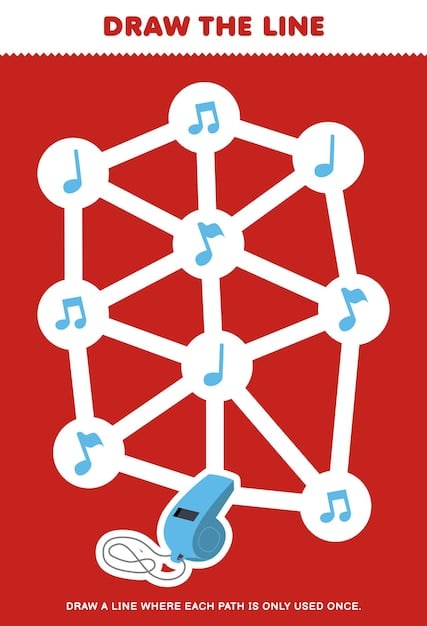Blockchain & Music: Revolutionizing the US Music Industry

Blockchain in music is transforming how artists are compensated and how music is distributed, offering new opportunities for creators and fans in the United States through secure and transparent systems.
The intersection of blockchain and music: Empowering artists and revolutionizing the music industry in the US is creating a seismic shift, offering solutions to long-standing issues like fair compensation and copyright management. This innovative technology has the potential to reshape the industry’s structure, empowering artists to connect directly with their fans and monetize their work in new and exciting ways.
Understanding Blockchain’s Potential in Music
Blockchain technology offers a novel approach to many of the challenges plaguing the traditional music industry. Its decentralized and transparent nature can provide solutions for copyright issues, royalty distribution, and direct artist-to-fan engagement.
By leveraging blockchain’s unique attributes, musicians can regain control over their creative work and revenue streams, fostering a more equitable and sustainable ecosystem for artists and consumers alike.
Decentralized Music Distribution
One of the most promising applications of blockchain in music is the creation of decentralized platforms for music distribution. These platforms allow artists to bypass traditional intermediaries like record labels and streaming services, offering them greater control over their work and earnings.
Smart Contracts for Royalty Payments
Smart contracts are self-executing agreements written into the blockchain code. In the context of music, smart contracts can automate the distribution of royalties, ensuring that artists and rights holders receive their fair share of revenue in a transparent and timely manner.
- Transparency: All transactions are recorded on the blockchain, providing a clear and auditable record of royalty payments.
- Automation: Smart contracts automate the distribution process, eliminating delays and reducing administrative costs.
- Fairness: Artists can set their own royalty rates and licensing terms, ensuring they receive fair compensation for their work.
- Efficiency: Streamlining processes reduces the need for intermediaries, allowing for faster and more direct payments.
In essence, blockchain is set to redefine the structure of the music industry for the better.

Empowering Artists Through Blockchain
Blockchain technology provides artists with unprecedented opportunities to control their work and connect with their audience directly. By leveraging blockchain-based platforms and tools, artists can forge new relationships with their fans and build sustainable careers on their own terms.
From tokenizing their music to creating decentralized autonomous organizations (DAOs), artists are exploring innovative ways to harness the power of blockchain to revolutionize their creative process and business models.
Direct artist-to-fan engagement is a major advantage of this technology.
NFTs and Music Ownership
Non-fungible tokens (NFTs) have emerged as a powerful tool for artists to monetize their work and connect with their fan base. By tokenizing their music, artists can create limited-edition digital collectibles that fans can purchase and trade, creating new revenue streams and fostering a sense of community.
DAOs for Music Collectives
Decentralized autonomous organizations (DAOs) are community-led organizations governed by smart contracts on the blockchain. DAOs can be used to manage music collectives, allowing artists and fans to collaborate on projects, share resources, and make decisions collectively.
- Community Governance: DAOs enable fans to participate in the decision-making process, fostering a sense of ownership and engagement.
- Transparent Operations: All DAO activities are recorded on the blockchain, providing a transparent and auditable record of transactions and decisions.
- Shared Resources: DAOs allow artists to pool resources and share expenses, reducing financial burdens and fostering collaboration.
Clearly, blockchain has many strengths that are beneficial to the music community.
Revolutionizing Music Industry Economics
Blockchain technology has the potential to reshape the economic landscape of the music industry, creating a more equitable and sustainable ecosystem for artists and rights holders. By streamlining royalty payments, eliminating intermediaries, and fostering direct artist-to-fan engagement, blockchain can unlock new revenue streams and create new opportunities for growth.
As blockchain adoption continues to grow, we can expect to see even more innovative applications emerge, further transforming the way music is created, distributed, and consumed.
Cutting Out Intermediaries
Traditional music industry economics are complex and often disadvantageous for artists. By cutting out intermediaries like record labels and distributors, blockchain can allow artists to retain a larger share of their revenue and negotiate more favorable terms.
Transparent Royalty Distribution
One of the biggest pain points in the music industry is the lack of transparency in royalty distribution. Blockchain can address this issue by creating a transparent and auditable system for tracking and distributing royalties, ensuring that artists and rights holders receive their fair share of revenue.
- Automated Payments: Smart contracts can automate the distribution of royalties, eliminating delays and reducing administrative costs.
- Real-Time Tracking: Blockchain enables real-time tracking of music usage, providing artists with up-to-date information on how their music is being consumed.
- Reduced Fraud: The transparency and security of blockchain can help reduce fraud and ensure that royalties are distributed fairly.
For these reasons and more, blockchain is becoming more and more commonplace in music.

Challenges and Obstacles to Blockchain Adoption
Despite its immense potential, blockchain adoption in the music industry faces several challenges and obstacles. These challenges range from technical hurdles to regulatory uncertainties, requiring careful consideration and strategic solutions to overcome.
Addressing these hurdles is essential to unlocking the full potential of this transformative technology and creating a more equitable and sustainable music ecosystem.
Awareness is one of the bigger hurdles.
Scalability Issues
Blockchain networks can be slow and expensive, especially when processing large volumes of transactions. This can be a major impediment to the widespread adoption of blockchain in the music industry, where millions of micro-transactions occur every day.
Regulatory Uncertainty
The regulatory landscape surrounding blockchain and cryptocurrencies is still evolving, creating uncertainty for businesses and users. Clear and consistent regulations are needed to provide a stable and predictable environment for blockchain innovation in the music industry.
- Legal Frameworks: Regulators need to develop legal frameworks that address the unique challenges and opportunities presented by blockchain technology.
- Data Privacy: Blockchain applications must comply with data privacy regulations like GDPR and CCPA, ensuring that user data is protected and handled responsibly.
- Tax Implications: Clear guidance is needed on the tax implications of using blockchain and cryptocurrencies in the music industry.
Overcoming these obstacles is important for artists, and for the industry as a whole.
Successful Blockchain Music Platforms
Several blockchain-based music platforms have emerged in recent years, showcasing the potential of this technology to transform the industry. These platforms offer a range of features, from decentralized music distribution to NFT marketplaces, providing artists with new ways to connect with their fans and monetize their work.
By examining these successful platforms, we can gain valuable insights into the best practices and strategies for implementing blockchain technology in the music industry.
Many success stories have emerged from these platforms.
Audius
Audius is a decentralized music streaming platform that allows artists to upload and share their music directly with fans. The platform uses blockchain technology to ensure fair compensation for artists and transparent royalty distribution.
Catalog
Catalog is an NFT marketplace for music that allows artists to create and sell limited-edition digital collectibles. The platform provides artists with a new way to monetize their music and connect with their fan base through unique and engaging experiences.
- Community Building: NFT marketplaces like Catalog foster a sense of community among artists and fans, creating new opportunities for collaboration and engagement.
- Unique Content: Artists can create unique and exclusive content for their NFT holders, rewarding their fans for their support.
- Revenue Generation: NFTs provide artists with a new source of revenue, allowing them to monetize their music and creative work in innovative ways.
In short, Audius and Catalog are just the tip of the iceberg.
Future Trends in Blockchain and Music
As blockchain technology continues to evolve, we can expect to see even more innovative applications emerge in the music industry. From AI-powered music creation to decentralized virtual concerts, the future of blockchain and music is full of exciting possibilities.
By staying informed about these emerging trends, artists and industry professionals can prepare themselves for the changes ahead and capitalize on the opportunities that blockchain technology offers.
AI-Powered Music Creation
Artificial intelligence (AI) is rapidly transforming the music industry, enabling artists to create music more efficiently and explore new creative avenues. Blockchain can be used to secure and protect AI-generated music, ensuring that artists retain control over their creations.
Decentralized Virtual Concerts
Virtual concerts are becoming increasingly popular, providing artists with new ways to connect with their fans and generate revenue. Blockchain can be used to create decentralized virtual concert platforms that offer transparent ticketing, secure streaming, and fair compensation for artists.
- Global Reach: Virtual concerts can reach a global audience, allowing artists to connect with fans from all over the world.
- Interactive Experiences: Blockchain-based virtual concert platforms can offer interactive experiences, such as live Q&A sessions and virtual meet-and-greets.
- New Revenue Streams: Virtual concerts can generate new revenue streams for artists through ticket sales, merchandise, and sponsorship opportunities.
In conclusion, the future is bright!
| Key Point | Brief Description |
|---|---|
| 🎵 Decentralized Platforms | Bypass traditional intermediaries and give artists more control. |
| 💰 Smart Contracts | Automate royalty distribution, ensuring transparency and fairness. |
| 🖼️ NFTs | Provide new ways for artists to monetize their work and engage fans. |
| 🤖 AI & Music | Blockchain secures AI-generated music, preserving artists’ control. |
FAQ
▼
Blockchain is a decentralized, immutable ledger that records transactions across many computers. This makes it secure, transparent, and resistant to tampering, ideally suited for managing digital assets and transactions.
▼
It empowers them by facilitating direct connections with fans, ensuring transparent royalty distribution, and offering new revenue streams through NFTs and decentralized platforms. It also reduces reliance on traditional intermediaries.
▼
NFTs are non-fungible tokens that represent unique digital assets, such as songs, albums, or merchandise. They allow artists to create limited-edition collectibles for fans and generate revenue through direct sales and royalties.
▼
Challenges include scalability, regulatory uncertainty, and the need for greater public awareness and adoption. Overcoming these hurdles is important for blockchain’s full potential in music.
▼
Future trends include AI-powered music creation secured by blockchain, decentralized virtual concerts, and more innovative applications for NFTs, as the technology continues to evolve and artists find new ways to utilize it.
Conclusion
In conclusion, the integration of blockchain technology into the music industry heralds a new era of empowerment for artists and a revolution in how music is created, distributed, and consumed. Despite the challenges, the potential benefits of transparency, direct engagement, and new revenue streams make blockchain a transformative force in the US music scene.





